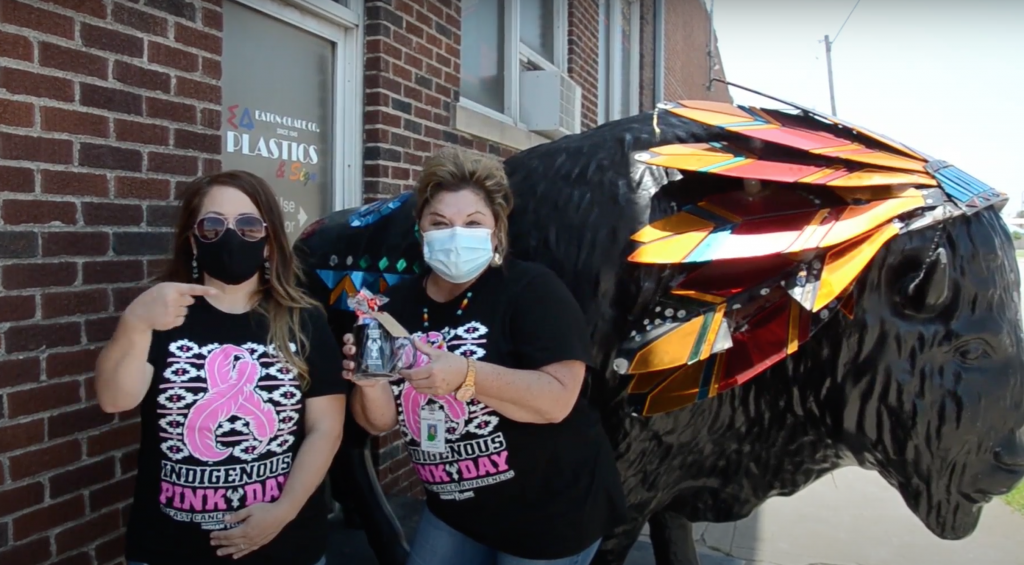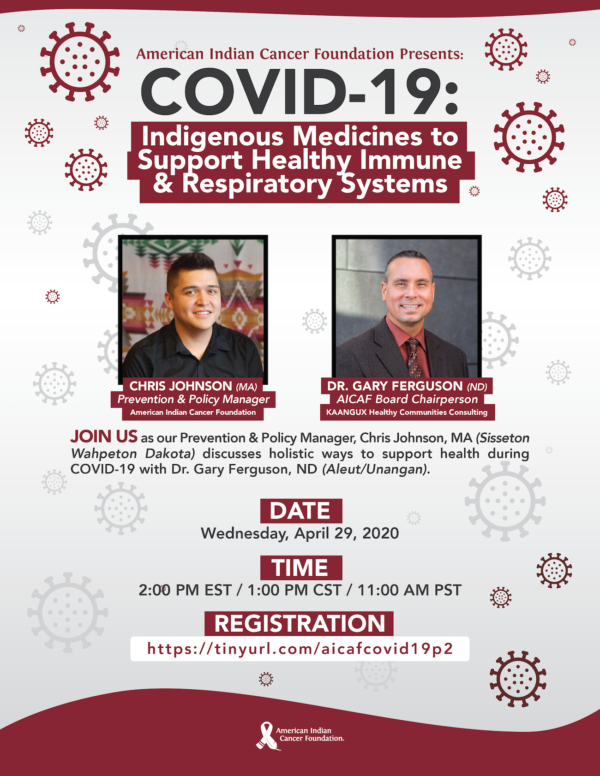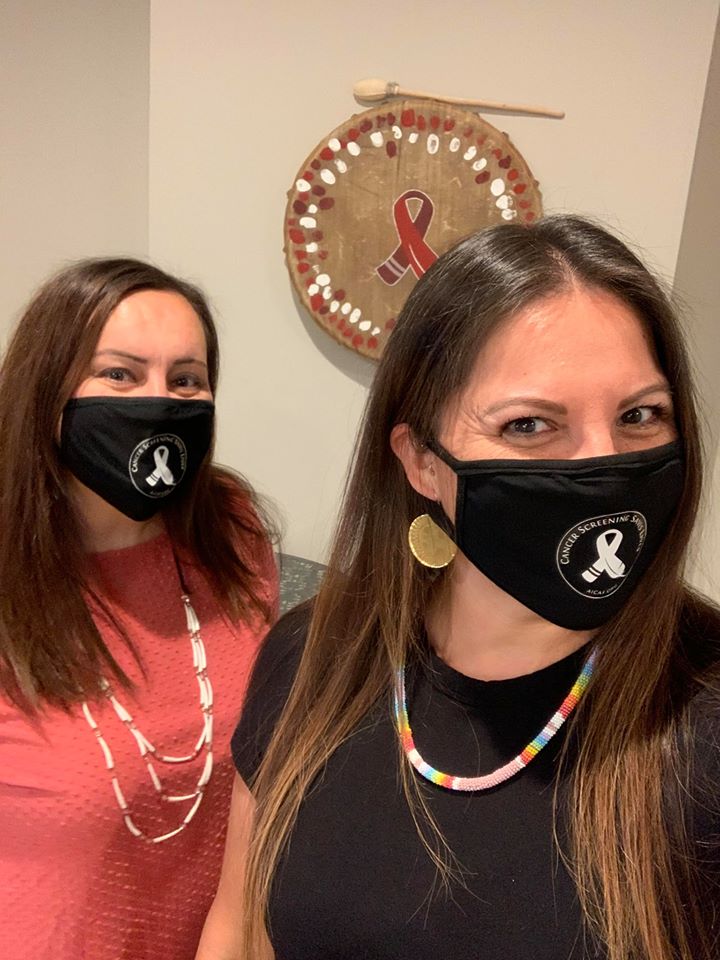The coronavirus disease of 2019 (COVID-19) is reminding us of the deep societal inequities that make certain populations more vulnerable to harm and illness than others. Today, we are seeing this play out as two Indigenous tribal nations, White Mountain Apache and Navajo Nation, lead the United States (U.S.) in COVID-19 cases. Though COVID-19 is a novel virus, devastation by disease is not new to Indigenous people. Western contact first introduced Indigenous communities to a wide range of contagions that they had no immunity to, such as measles and smallpox, and claimed many Indigenous lives. Following contact, centuries of colonization, genocide, and exclusion led to the continuous loss and erasure of Indigenous people, culture, narratives, and land, and created conditions that consistently threaten the health and wellbeing of Indigenous people to this day.

Today, the 6.9 million American Indian and Alaska Native people residing in the U.S. are disproportionately affected by pre-existing and underlying health conditions that increase their risk for serious COVID-19 infection. One risk factor, cancer, is the leading cause of death among Indigenous women in the United States and the second leading cause of death among Indigenous men. Both COVID-19 and cancer disparities are perpetuated by the high rates of financial instability and housing and food insecurity across Indian Country, the poor access to medical services in the already limited and underfunded Indian Health Services, and the inadequate surveillance of Indigenous health. For the latter, underreporting and the racial misclassification of Indigenous people as mixed-race or other in public health data endangers Indigenous communities by making their health needs and emergencies hidden and neglected.
As the pandemic continues to complicate and expose systemic differences in Indigenous health outcomes, we are inspired by the ways Indigenous communities are swiftly and collectively responding to the crisis with strength, generosity, courage, and resilience.

Despite the lagging federal and state responses to COVID-19 in tribal communities, tribal governments are leading the way with their sovereign rights to self-govern and take emergency measures to keep their communities safe. In doing so, they were quick to shut down the tribal economy and establish health checkpoints to help curb the spread of the deadly virus. Moreover, Indigenous coalitions are mobilizing to advocate for the inclusion of Indigenous health systems in federal relief funds, and Indigenous organizations are taking precautionary measures to prevent further harm to Indigenous people. For example, the Urban Indian Health Institute created a guide to support public health agencies in accurately representing the Indigenous population in public health data.
At the community level, Indigenous translators are increasing awareness and preventing the spread of misinformation by translating culturally and linguistically relevant and factual COVID-19 information for their communities. Other volunteers are gathering resources and hosting food drives to support Indigenous communities in meeting essential needs. Furthermore, Indigenous artists are creating face masks with Indigenous designs to protect their communities and pay homage to their heritage, and community leaders are promoting social and cultural connections by moving their annual powwows celebrations online. These are some of the many examples of how Indigenous communities are healing and taking matters into their own hands.
The American Indian Cancer Foundation joins Indian Country in combating the COVID-19 pandemic. At the American Indian Cancer Foundation (AICAF), healing with culture and reclaiming Indigenous health are among the organization’s core values. AICAF believes that Native communities have the wisdom to find the solutions to cancer inequities, but are often seeking the organizational capacity, expert input, and resources to do so. AICAF is actively working to eliminate the cancer burdens of Native people through improved access to prevention, early detection, treatment, and survivor support, and supports innovative, community-based interventions that engage Native populations in the discovery of their own cancer best practices.

To provide additional support to Indigenous cancer survivors during these trying times, AICAF is offering free face masks to cancer survivors, including caregivers and family members, and is partnering with the Blue Cross and Blue Shield Minnesota Foundation to provide COVID-19 relief funds. AICAF is also hosting virtual support groups for Indigenous cancer survivors and offering free resources, tools, and webinars that empower survivors to take an active role in their health and wellbeing. The webinars being offered cover a wide range of topics that highlight traditional lifeways and wisdom that preserved the health of Indigenous elders and ancestors, and practical ways to incorporate these practices into everyday life. As tribes, cities, and states reopen and plan for reopening, AICAF continues to explore and innovate opportunities for sustainably promoting Indigenous health and is currently looking into ways to support tribes in developing policy for smoke-free casinos as part of the reopening plan for tribal gaming industries.
“We know the unfortunate disparities that exist within our Tribal Nations,” says Melissa Buffalo, a Meskwaki/Dakota member and the Deputy Director at AICAF, “our work in addressing and eliminating them are far from over, but the beautiful thing about our communities, our culture, and our traditional ways of knowing is our deep connection to both trauma and resiliency and the strength of our people to make positive change.
“I do this for my elders, my colleagues but most importantly for my children who will continue this work for their future generations,” says Buffalo.
Learn more about Indigenous cancer survivors and ways you can support them at www.AmericanIndianCancer.org
Subscribe to the American Indian Cancer Foundation’s newsletter at www.AmericanIndianCancer.org/current-events/
If you are an Indigenous cancer survivor, learn more about how you can join our growing survivor network and support group by emailing [email protected]
You can also find the American Indian Cancer Foundation on Facebook, Instagram, Twitter, and YouTube.

The American Indian Cancer Foundation (AICAF) is a national non-profit organization that was established to address the tremendous cancer inequities faced by Native communities. AICAF is Native-governed; its board members and employees have an array of experience serving the health needs of our people.
Life expectancy at birth is a summary measure of mortality and is commonly used as an indicator of social equity.9 In Australia, it has been used to assess the relative disadvantage of the Indigenous population, and has served as a powerful device in advocacy for Indigenous health. Its calculation, however, is dependent on the quality of information about population size and deaths by age and sex,10 which forms the basis of the estimation of the life expectancy of the Australian population by the standard or direct approach. Concern around the quality of Indigenous data, especially data on Indigenous deaths, has led to the use of various indirect methods of estimating Indigenous life expectancy.